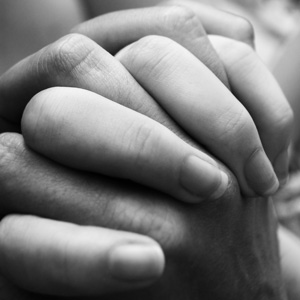by Julia Seymour
I saw the pair of shoes on the shelf near the window, when I was almost out the door. Their eye-catching color and unusual heel shape pulled me like a magnet. “Please don’t be my size, please don’t be my size,” I chanted, as I lifted the right one. Phew! The number suggests they’ll be too large. “You never know until you try them on,” whispers a little voice in my ear. I shake my head to clear it and firmly say out loud, “Cargo cult.” I put the shoe back and walk out of the store, completely empty-handed.
The little bag of yarn reels me in like the catch of the day. With eight balls of coordinating yarn, I think of the fun little projects I could make. Sure I have yarn at home I haven’t used yet, but not like this. I could make a…
“Cargo cult.” And I push the cart on to complete my grocery list.
I have talked with my husband again and again about making a weekly meal plan, but something always comes up and so we never do. I buy groceries for the week, attempting to guess what we might eat. I usually forget something I bought, only to find it later—rotting in a corner or drawer of the fridge or dust-covered in the back of the pantry.
Embarrassed, I throw it away or compost it, muttering: “Cargo cult.”
In reality, a cargo cult is a complex spiritual and religious system—most frequently found in islands of the South Pacific. The belief system is oriented around specific worship practices and living habits that organize the social relationships of the community. There is also an expectation that the correct religious practice will result in material blessings from gods or ancestors.
A history of cargo cults
 The most famous cargo cults are known from the World War II era. Japanese and Allied forces occupied various islands in the South Pacific. The occupiers arrived with large quantities of supplies, often including food and fuel in types and amounts previously unknown on the islands. Where relations were good, the occupying armies shared their goods with the residents, significantly changing their lifestyle. At the end of the war, occupying forces left, often promising to return. The cult behavior developed when island leaders organized group behavior and set up shrines with the expectation and promise that correct behavior and belief would result in a return of the people and their cargo.
The most famous cargo cults are known from the World War II era. Japanese and Allied forces occupied various islands in the South Pacific. The occupiers arrived with large quantities of supplies, often including food and fuel in types and amounts previously unknown on the islands. Where relations were good, the occupying armies shared their goods with the residents, significantly changing their lifestyle. At the end of the war, occupying forces left, often promising to return. The cult behavior developed when island leaders organized group behavior and set up shrines with the expectation and promise that correct behavior and belief would result in a return of the people and their cargo.
While we might want to dismiss this behavior as primitive, the truth is we often set up our own cargo culture. Like my own experiences listed above, we often long for things for which we do not have a material need that we do not need. Do you have a friend who perks up when she has a new purchase or an acquaintance who is always waving the latest phone or gadget? Do you feel frustrated when you think of something as slow or old or no longer useful, only to realize it is not that old–maybe a few months or a year in your possession since you got it?
We crave that experience of something new, something to open, something fresh and full of promise. We live in a cargo culture–a cargo cult that worships newness, cheapness, and disposability. Visible in commercials and print advertising, we are constantly confronted with messages about our worth, our abilities, and our image. There is the shrine of the cash register, the offering of a credit card, the worship of the product, and the faith in the experiencing of shopping and acquiring as renewing.
These idols fail. The cargo culture wants to be God, but it falls woefully short. In the end, when we are grieving, when we are rejoicing, when we are curious, when we are righteously angry, a cargo culture cannot satisfy our needs for something true and lasting. The Holy Spirit reorients us back to home—our place of rest in God’s grace and mercy.
Untethered, unburdened
 Quiet prayer brings a calm comfort and allows for questions. The only thing I need to recycle is the insight I receive in reflecting on Jesus. A long walk with a friend brings both laughter and mutual support. The only debt afterwards is for the next time, when I promise to chauffeur. Sorting through things at my house, even for 15 minutes, and deciding on something to give away makes me feel lighter and less tethered by things.
Quiet prayer brings a calm comfort and allows for questions. The only thing I need to recycle is the insight I receive in reflecting on Jesus. A long walk with a friend brings both laughter and mutual support. The only debt afterwards is for the next time, when I promise to chauffeur. Sorting through things at my house, even for 15 minutes, and deciding on something to give away makes me feel lighter and less tethered by things.
Our modern cargo cult is not just something we need to resist. It is something that we, as believers in Christ, are called to alter. Our baptisms bring us not into a cargo cult, but into a community in Christ, a way of defining lives through hope and grace. Community in Christ is shaped not by what we have, but by what we share. Community in Christ is reflected not by what we buy, but by what we say. Community in Christ is determined not by what we do, but by what has been done for us.
When we refuse to buy more than we need or when we resist upgrading just for the sake of something new, we are living into community in Christ. We are allowing those around us to see that we are defined by grace, not cargo. We worship the God of salvation, not of sales or brands or material wealth.
I went home in my perfectly good shoes, started a scarf from my yarn stash, and began to think out a meal plan. As a child of God, I know grace is present in each moment of my life. I don’t want stuff to get in the way of that experience. I’m not living for a cargo cult, but for the community in Christ.
Reflection Questions:
1. Do you notice advertising around you? What tactics do commercials and print ads use? What is a commercial that always draws you in and makes you curious about the product?
2. Do we live in a “cargo culture”? How do the values of “newness, cheapness, and disposability” affect your daily life?
3. How can the church provide an alternative to cargo culture? Can you create a commercial to sell community in Christ?
Closing prayer
God of all creation, all good things come from you–hope, faith, and love. Yet many things distract us from your goodness. Stir up our faith and strengthen us to resist the call of false promises and empty idols. Open our minds to see and comprehend more clearly all that is offered through community in Christ–support, love, and grace. Through your Holy Spirit, draw us together with others who trust in you that our lives together may more strongly reflect the light of your love in Jesus Christ our Lord. Amen.
The Rev. Julia Seymour serves the people of Lutheran Church of Hope in Anchorage, Alaska. She lives with her husband, their two young children, and a beloved Labrador retriever. She enjoys reading, loom knitting, and outdoor photography.


Thank you, Pastor Julia, for acutely focusing on ‘stuff’ idolatry, which so often seems harmless and benign. I can certainly attest to my own idolatry with the numerous storage containers filled with unfinished projects, unused sale items, and ‘forgotten’ gifts! My self-centeredness, though, blurs and diminishes a full experience of God’s care and graciousness in God’s relationship with me and the community of faith. Instead of wanting more stuff, I pray for a thankful & grateful heart to be content with the many blessings God has already given to me.
Dear Pastor Julia, I’m 59. My mom was born in 1913 and a survivor of the depression here in NE Iowa. As a farmgirl I grew up instilled in saving ways just because we HAD no money! Many experiences in my life have joined my faith to make me aware of how my presence on earth affects other people and this planet. Your ‘cargo cult’ reference was unfamiliar in its choice of words but basic in how we as Christians struggle in this immediate gratification of our selfishness in this culture. Thank you for sharing your refreshing thoughts. In Jesus’ name, Mary
“Community in Christ is shaped not by what we have, but by what we share.” Love this quote!
Excellent article and reminder–and I can SO identify with its message! Thank you for it!
Thank you so much. We need constant reminders that “stuff,” rather than satisfy, whet the appetite. It is a monster that demands incessantly, “Feed me! Feed me!”–and we continuously bring our treasures, made for and capable of filling real needs, and drop them before the beast.
Always a good reminder about the differences of what we need and what we want. And, especially for those of us raising kids with new “stuff” and technology that seems to be released every other day!
I guess I needed to read this because the first thing I thought when I saw those red shoes is, “Where can I get those? I love them.” Chances are I am drawn into that “cargo culture” but I do have a method of dealing with it. Whenever I am tempted to buy something I don’t need, I wait 24 hours to buy it. That way I get to see if it is still on my radar. I also figure out how many hours I have to work to pay for it on my net pay and lots of times, that will make me change my mind.